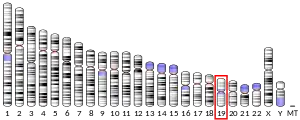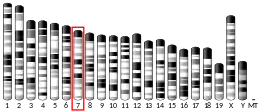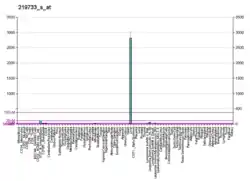Bile acyl-CoA synthetase is an enzyme that in humans is encoded by the SLC27A5 gene.[5][6][7]
The protein encoded by this gene is an isozyme of very long-chain acyl-CoA synthetase (VLCS). It is capable of activating very long-chain fatty-acids containing 24- and 26-carbons. It is expressed in liver and associated with endoplasmic reticulum but not with peroxisomes. Its primary role is in fatty acid elongation or complex lipid synthesis rather than in degradation. This gene has a mouse ortholog.[7]
See also
References
- 1 2 3 GRCh38: Ensembl release 89: ENSG00000083807 - Ensembl, May 2017
- 1 2 3 GRCm38: Ensembl release 89: ENSMUSG00000030382 - Ensembl, May 2017
- ↑ "Human PubMed Reference:". National Center for Biotechnology Information, U.S. National Library of Medicine.
- ↑ "Mouse PubMed Reference:". National Center for Biotechnology Information, U.S. National Library of Medicine.
- ↑ Steinberg SJ, Wang SJ, McGuinness MC, Watkins PA (Oct 1999). "Human liver-specific very-long-chain acyl-coenzyme A synthetase: cDNA cloning and characterization of a second enzymatically active protein". Mol Genet Metab. 68 (1): 32–42. doi:10.1006/mgme.1999.2883. PMID 10479480.
- ↑ Steinberg SJ, Mihalik SJ, Kim DG, Cuebas DA, Watkins PA (Jun 2000). "The human liver-specific homolog of very long-chain acyl-CoA synthetase is cholate:CoA ligase". J Biol Chem. 275 (21): 15605–8. doi:10.1074/jbc.C000015200. PMID 10749848.
- 1 2 "Entrez Gene: SLC27A5 solute carrier family 27 (fatty acid transporter), member 5".
Further reading
- Fisher E, Nitz I, Lindner I, et al. (2007). "Candidate gene association study of type 2 diabetes in a nested case-control study of the EPIC-Potsdam cohort - role of fat assimilation". Mol Nutr Food Res. 51 (2): 185–91. doi:10.1002/mnfr.200600162. PMID 17266179.
- Tu N, Hu Y, Mivechi NF (2006). "Heat shock transcription factor (Hsf)-4b recruits Brg1 during the G1 phase of the cell cycle and regulates the expression of heat shock proteins". J. Cell. Biochem. 98 (6): 1528–42. doi:10.1002/jcb.20865. PMID 16552721. S2CID 36553127.
- Ota T, Suzuki Y, Nishikawa T, et al. (2004). "Complete sequencing and characterization of 21,243 full-length human cDNAs". Nat. Genet. 36 (1): 40–5. doi:10.1038/ng1285. PMID 14702039.
- Mihalik SJ, Steinberg SJ, Pei Z, et al. (2002). "Participation of two members of the very long-chain acyl-CoA synthetase family in bile acid synthesis and recycling". J. Biol. Chem. 277 (27): 24771–9. doi:10.1074/jbc.M203295200. PMID 11980911.
- Watkins PA, Pevsner J, Steinberg SJ (2000). "Human very long-chain acyl-CoA synthetase and two human homologs: initial characterization and relationship to fatty acid transport protein". Prostaglandins Leukot. Essent. Fatty Acids. 60 (5–6): 323–8. doi:10.1016/S0952-3278(99)80007-6. PMID 10471116.
- Hirsch D, Stahl A, Lodish HF (1998). "A family of fatty acid transporters conserved from mycobacterium to man". Proc. Natl. Acad. Sci. U.S.A. 95 (15): 8625–9. Bibcode:1998PNAS...95.8625H. doi:10.1073/pnas.95.15.8625. PMC 21126. PMID 9671728.
- Berger J, Truppe C, Neumann H, Forss-Petter S (1998). "A novel relative of the very-long-chain acyl-CoA synthetase and fatty acid transporter protein genes with a distinct expression pattern". Biochem. Biophys. Res. Commun. 247 (2): 255–60. doi:10.1006/bbrc.1998.8770. PMID 9642112.
This article is issued from Wikipedia. The text is licensed under Creative Commons - Attribution - Sharealike. Additional terms may apply for the media files.




